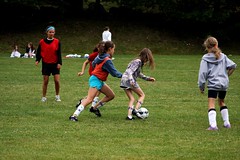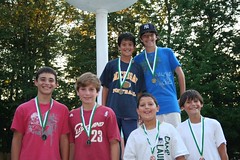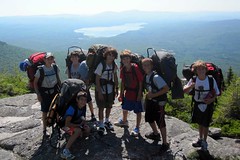 Moving from one year towards the next has me thinking about summer camp in the past and future. For over a century, summer camps in the United States have helped millions of American children develop and grow as well as start negotiating their worlds outside of immediate families and neighborhoods. At first, a small number of elite camps only served boys, and primarily Protestant boys at that — but by the time the prosperous years after World War II were in full swing, approximately one in six American children went to camp, usually for eight weeks at a time. Throughout the 20th century, camps changed to serve all children including varying camp lengths, welcoming girls, and opening their gates to all races.
Moving from one year towards the next has me thinking about summer camp in the past and future. For over a century, summer camps in the United States have helped millions of American children develop and grow as well as start negotiating their worlds outside of immediate families and neighborhoods. At first, a small number of elite camps only served boys, and primarily Protestant boys at that — but by the time the prosperous years after World War II were in full swing, approximately one in six American children went to camp, usually for eight weeks at a time. Throughout the 20th century, camps changed to serve all children including varying camp lengths, welcoming girls, and opening their gates to all races.
 As summer camps have become more inclusive, the world that children experience both in the United States and globally has also become very different. Many children have access to a much broader world through travel, moving images, or other technologies, but some things just haven’t changed. For instance, our pre-college age identities are still informed by interactions with peers and people connected to our individual worlds, directly translating to the people we make direct contact with. While community is still central to human development, many of our daily communities are no longer bound by neighborhood blocks tied to local shared institutions and celebrations. Our families and extended social circles filter across state, nation and even electronic borders.
As summer camps have become more inclusive, the world that children experience both in the United States and globally has also become very different. Many children have access to a much broader world through travel, moving images, or other technologies, but some things just haven’t changed. For instance, our pre-college age identities are still informed by interactions with peers and people connected to our individual worlds, directly translating to the people we make direct contact with. While community is still central to human development, many of our daily communities are no longer bound by neighborhood blocks tied to local shared institutions and celebrations. Our families and extended social circles filter across state, nation and even electronic borders.
SO, since children today live in this exciting world of shifting boundaries most months of the year, summer camp is the perfect environment to find time for nurturing our human need to create community. For the past century and through some necessary changes, the basic premise of summer camp has remained the same—camp is a designated, safe space dedicated to fostering and experiencing community life, personal development and skill-building. Each year as improvements are made to camp facilities and other choices, some things don’t change, like living in cabins or bunks, daily activities together, arts and crafts, hikes, water and land sports, singing camp songs and roasting marshmallows around campfires to name a few! Lessons learned at camp and friendships made there can provide the “glue” to help children become well-rounded adults in the future.
 Past, present and future campers are all part of a lively and creative shared community where remembering a song, a person, an event, a skit, food or a poignant moment can instantly transport peers back to camp. So, what you would add to a time capsule to “capture” the timeless spirit of camp and why? We’d love to hear what alumni and present campers would include in an electronic time capsule, so get scanning or writing up those memories and lessons learned! If you’re not sure how to get started, ask questions in the comments below!
Past, present and future campers are all part of a lively and creative shared community where remembering a song, a person, an event, a skit, food or a poignant moment can instantly transport peers back to camp. So, what you would add to a time capsule to “capture” the timeless spirit of camp and why? We’d love to hear what alumni and present campers would include in an electronic time capsule, so get scanning or writing up those memories and lessons learned! If you’re not sure how to get started, ask questions in the comments below!
Emma

Thank to openDemocracy for the image.


 As parents, we are always on the lookout for experiences that help our children learn new skills. We enroll them in music lessons, martial arts, sports, theatre, choir and, of course, summer camps. But we all know that the best programs (and the best educational experiences) are ones that go beyond the basics of teaching skills to help develop our children’s character. The basics of character — trustworthiness, respect, responsibility, fairness, caring and citizenship — are all essential ingredients in summer camp experiences.
As parents, we are always on the lookout for experiences that help our children learn new skills. We enroll them in music lessons, martial arts, sports, theatre, choir and, of course, summer camps. But we all know that the best programs (and the best educational experiences) are ones that go beyond the basics of teaching skills to help develop our children’s character. The basics of character — trustworthiness, respect, responsibility, fairness, caring and citizenship — are all essential ingredients in summer camp experiences. Everything we’ve written about on this blog so far — being ready for camp, unplugging from the digital world, traveling to camp, developing interpersonal communication skills, interacting with camp counselors, participating in camp traditions, and learning new sports and skills all contribute to building character.
Everything we’ve written about on this blog so far — being ready for camp, unplugging from the digital world, traveling to camp, developing interpersonal communication skills, interacting with camp counselors, participating in camp traditions, and learning new sports and skills all contribute to building character. It’s no surprise, really. Camp activities, to be successful, require all the participants to have self-discipline and an unselfish sense of camaraderie. “There is just something about living with a group of boys,” mom Wendy says after sending her only son Justin to camp for the first time. Living communally in cabins and bunks requires teamwork, creativity and a willingness to work together.
It’s no surprise, really. Camp activities, to be successful, require all the participants to have self-discipline and an unselfish sense of camaraderie. “There is just something about living with a group of boys,” mom Wendy says after sending her only son Justin to camp for the first time. Living communally in cabins and bunks requires teamwork, creativity and a willingness to work together.